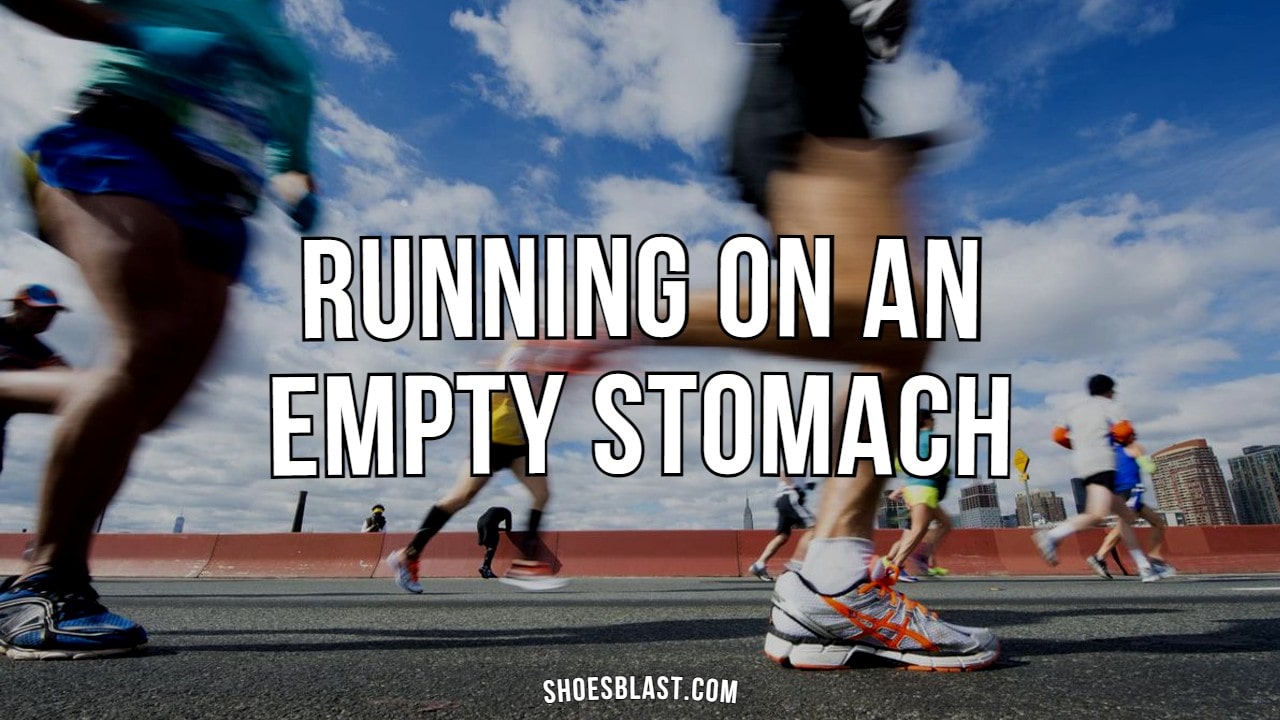The Cons | The Pros | Myths Busted | Summary
Researchers don’t have solid evidence to prove if running on an empty stomach has a positive impact on reducing fat burning, improving aerobic endurance, or losing weight, but there is evidence suggesting that running on an empty stomach could increase the risk of injury, and decrease performance
You probably know someone who prefers running on an empty stomach and never had any issue with it. Also, you might also know someone who could never go for a run without having something in their stomach. It is well known that everybody is different, but in this situation how the body reacts to fasting cardio it’s a matter of personal goal.
Is your goal to lose weight? is your goal to increase your performance? What is your goal? There is much misleading information out there. Think about what you would like to gain by running on an empty stomach and make sure this is the right approach. For some people with certain health conditions (such as Diabetes or Addison’s Disease), it is dangerous to run on an empty stomach. Make sure to do some research or check your doctor first.
Some of the reasons for not eating in the morning can be due to lack of time, not feeling hungry, or being afraid that will compromise the workout (digestive problems). If you feel good exercising on empty stomach it doesn’t mean that your body or athletic performance is not affected by it.
It also matters how much you’re exercising and the intensity of it. Going for a 10–20-minute run on an empty stomach will not affect your performance or health, especially if you had a good dinner the night before. Runs longer than 60 minutes or higher intensities require more fuel. There is where you should consider having a quick snack before, but we will go more in detail below.
The cons for running on an empty stomach.
Increases the risk of injuries.
Depending on what you ate for dinner, your body might not have enough fuel to sustain the effort. Therefore, you could start feeling fatigued and tired during your run, not pay attention to your surrounding, and get injured. There are many times when I almost fainted during a run because I didn’t have enough food in my body to sustain that effort.
Decreases muscle mass.
It is simple. Instead of using energy by burning fat storage, you are most likely to pull the required energy from your muscles. Have in mind that your muscles will not get weaker or disappear after one run on an empty stomach.
It is most likely to happen if exercising on an empty stomach is a long-term habit and you’re not getting enough protein with your meals.
Decreases performance.
Running without eating anything is usually done to lose weight, definitely not to increase performance. Our metabolism is very complex and works in unity with the body.
A car requires gas to drive, our bodies require fuel to run or exercise. Running while having low fuel could harm some “circuits”, which can lead to dizziness, fatigue, and so on. Another reason why it’s considered to be detrimental to performance is that not having proper or enough fuel will limit your ability to run harder intensities.
Once you run out of all the energy sources stored in your body, you’ll hit a wall and fatigue will set in, making it impossible to perform well.
Increases cortisol levels.
Cortisol is called the “stress hormone” and it is triggered by stress (acute, chronic, and traumatic) and blood sugar levels. Almost every cell in our body contains cortisol receptors, therefore, cortisol can have a lot of different actions, depending on the type of cell it acts on.
Since cortisol levels are higher in the morning, researchers have found that fasted running could increase your cortisol levels. This is a bad thing because high levels of cortisol are associated with many health outcomes. In this case, muscle fatigue, tiredness, restless sleep, etc.
Less energy.
Once your body is deprived of fuel and starts using from the “emergency “storage, you’ll most likely feel more tired.
The pros of running on an empty stomach
Might eliminate digestive discomfort. I know many people who won’t eat in the morning because their stomachs will hurt during cardio. This situation is very common among professional and amateur runners.
There are many reasons why runners experience digestive discomfort. This could be due to diet, hydration, and probiotics. Try paying attention to what you’re eating before the run, even if we are talking about 8h ago.
There are many foods that might trigger that discomfort. In my experience, I always have to avoid dairy, sugar, and vegetables a few hours before a run. Hydration is important for many reasons, but also for your digestion.
The tricky part with hydration is that too much hydration can cause cramps and digestive discomfort, while dehydration can cause the same thing. Try creating a habit of drinking enough water and electrolytes a few hours before the run and plenty of it right after.
Probiotics are known to keep our gut healthy and happy. Consider taking a probiotic supplement. It could help eliminate the digestive discomfort during your run by regulating the bowel movement.
Myths of running on an empty stomach
Burns more fat.
The problem with this affirmation is that the calories you burn in the fasting stage are more likely gained back throughout the day. There are a few ways how that could happen.
First, you’ll be hungrier after your run, therefore, you’ll eat a larger breakfast. Second, your body will be “scared” not to run out of fuel again and start burning fewer calories to make sure it will have enough to keep it fed so your body could function properly.
Helps lose weight.
If it’s done right, it might help you lose weight, but that includes more factors than just running on an empty stomach. It must be followed by specific training and diet. Most people assume that they will lose weight only by running on an empty stomach, which is not the case. As mentioned above, you might burn more calories for the moment, but it will compensate throughout the day by storing the fat and using more glucose instead.
is Running on an Empty Stomach Good for Weight Loss?
According to many experts, running on an empty stomach is not good for weight loss. The reason is, when you run on an empty stomach, your body starts to burn muscle for energy instead of fat. This can lead to muscle loss and make it harder to lose weight in the long run.
There are a few studies that seem to contradict this claim, however, they are mostly small and not well-designed. In one study, for example, obese women who ran on an empty stomach for 30 minutes burned more fat than those who ran after eating a carbohydrate-rich meal.
However, this study was very small (only 8 women) and not well-controlled. In addition, the women were not told to restrict their calories, so it’s possible that they simply ate less after running.
Another study found that men who ran on an empty stomach burned more fat than those who ran after eating a carbohydrate-rich meal. However, this study was also small (only 12 men) and not well-controlled.
In addition, the men were not told to restrict their calories, so it’s possible that they simply ate less after running.
So, while there are a few studies that seem to contradict the claim that running on an empty stomach is not good for weight loss, the vast majority of evidence suggests that it is not a good idea.
If you’re trying to lose weight, it’s important to eat a healthy diet and exercise regularly. Running on an empty stomach may help you burn more fat in the short-term, but it’s not a good long-term strategy.
In Short:
To summarize, when deciding to go outside for a run or do cardio, everyone has different reasons why they are doing it. Depending on your goal, you could run on an empty stomach, or you might have to change your routine and include a small snack before running. Achieving your goal but staying healthy should be your priority.
My recommendation is that you should try eating a small snack at least one hour before your run. Carbs are the main source of energy, therefore, focus on consuming a snack that contains good carbs. A few examples are banana; oatmeal; toast; zero sugar granola bar.

Hi there, my name is Petronela, and I am professional runner training in the United States but competing for Romania. I fell in love with running at the age of 14 when a stranger put around my neck a very shiny $3 dollar silver medal. Fourteen years later and I still get the same goosebumps when I win a medal.
The reason I am running is a true passion like it was when I was 14, the only difference is that small pressure to maintain the status of a professional runner, win races, and hit the times. That requires commitment, hard work, healthy choices, sacrifice, and many good pairs of running shoes. In my running career, I wore more than 1000 pairs of shoes, and my poor feet had the challenge to get used to them as many times.
I have a Master in Public Health Education and Promotion, a 4:34 indoor mile PR, a 4:13m 1500m PR, and 2:05 in the 800m. I run around 70 miles per week, and I am mentally preparing to run a 5k soon. The shoes I run in are one of the most important parts of the training process.
Nowadays, experts have developed amazing shoes that significantly impact and improve people’s athletic performances and because they are available to everyone for purchase, it is important to know which one is the best pair the shoes for you, to achieve your specific goal. That is why I am here. To share with you a little bit of my knowledge and expertise about shoes.
I hope you enjoy it!




